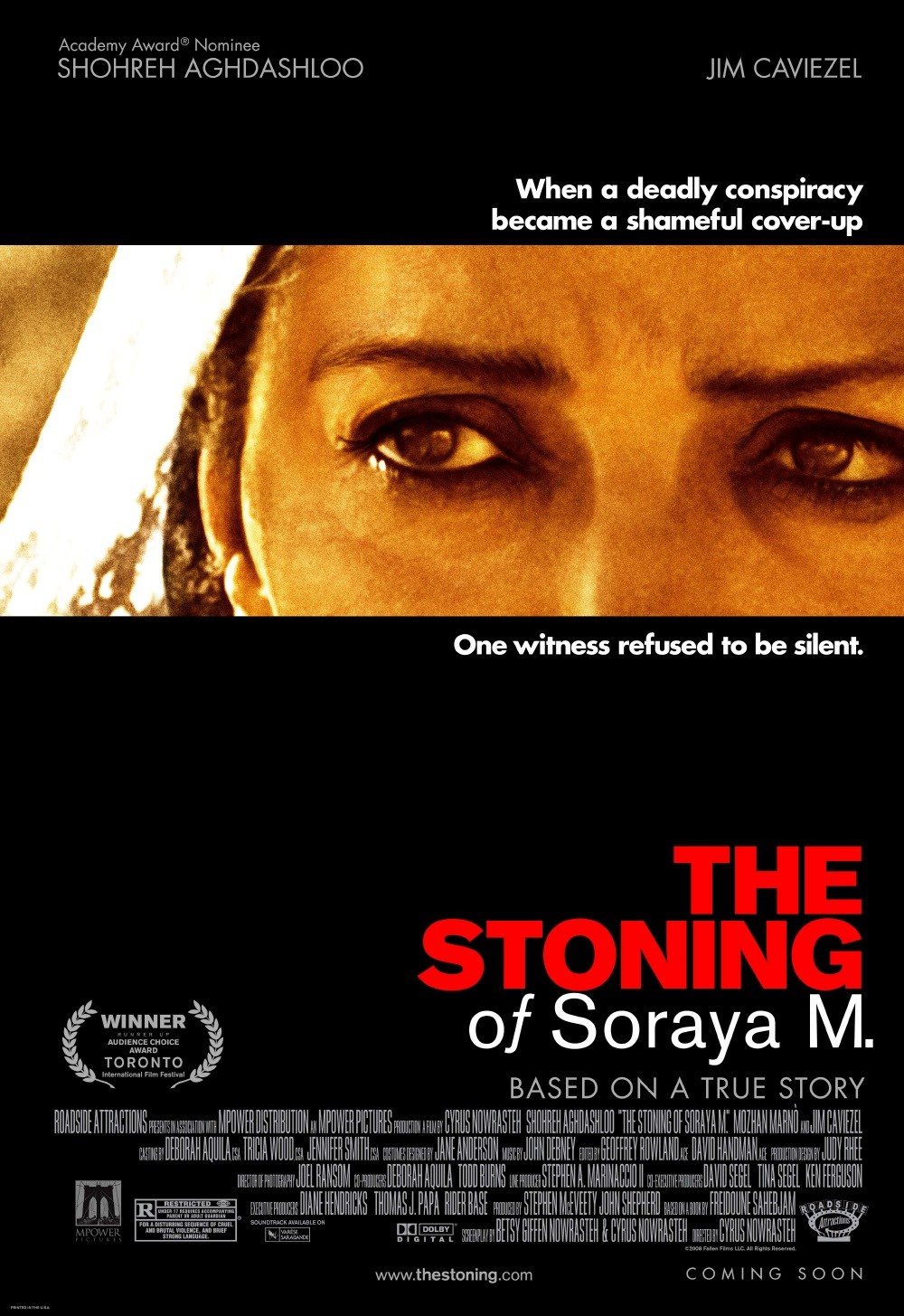I watched this movie at about 2 years ago, when I was finishing my studies in university. I find it interesting, mainly because it brings up such enclosed culture to the big screen. It is also said that this movie is based on true story, which interests me more to watch. The movie tells us about a foreign journalist (Freidoune Sahebjam, portrayed by James Caviezel) who have a car troubles in a remote Iranian village called Kuhpayeh. While waiting for his car to be repaired, he was called by a woman named Zahra. This woman asked Sahebjam to tell the story of her niece's stoning, which has happened the day before.

Stoning is a form of capital punishment carried by a group of people by throwing stones at a person until the person is dead. The Penal Code of Iran mentions detail processes of stoning, which would be carried out to a person convicted of adultery. In this movie, Soraya was stoned to death from a wrongful accusation of adultery by her husband. Soraya was slandered by her husband, Ali, because she refused to divorce him. Ali wants to marry a 14 year old girl and needs Soraya to grants him the divorce. He also manages to turn their 2 boys against Soraya. Ali wants to marry the 14 year old and keeps his sons, but he refuses to pay the monetary support. Which is why, together with the mayor (mullah), they plot an adultery accusation so that they can get rid of Soraya.
In this remote village, I can feel that there is a cultural pressure around the villager's development. Each and every villager abides to certain rules, which I find very patriarchal. I can see the men in the movie acts rather unpleasant and seems like they can do whatever they want, while the women mostly stay at home and raise their children. Like many other closed neighborhood, gossips travel faster than the speed of light. A rumor can dramatically changes into accusation in a blink of an eye. I can also see the corrupt figure of authorities who push and bully their way to get what they want.
Whether or not the story is true, the fact is there are corrupt governments, even in a village scale. And I think this movie succeeds to present reality to the audiences. It has domestic violence, patriarchal community, corrupt public figures, and other good villager who tried to help but failed because they are not strong enough to stand against authority figures. There are regrets of course, after knowing that they have stoned an innocent woman. But there's really nothing they can do, and the people responsible are trying to cover up their messes. Even though in the end, Zahra manages to reveals this horrible story to Sahebjam and the world now knows what exactly happen to Soraya.
The stories are complicated, but it's interesting enough to watch. Unfortunately, the blue and grey-ish ambiance bring certain depressed environment, which I'm not a fan of. The actors' pronounciation are a little bit difficult to understand since it's middle-east English pronounciation, but with a little subtitle, everything is tolerable. The stoning scene is excellent. The blood and the dramatic effects are perfect. It makes me wonder how to create such a scene.

Stoning is a form of capital punishment carried by a group of people by throwing stones at a person until the person is dead. The Penal Code of Iran mentions detail processes of stoning, which would be carried out to a person convicted of adultery. In this movie, Soraya was stoned to death from a wrongful accusation of adultery by her husband. Soraya was slandered by her husband, Ali, because she refused to divorce him. Ali wants to marry a 14 year old girl and needs Soraya to grants him the divorce. He also manages to turn their 2 boys against Soraya. Ali wants to marry the 14 year old and keeps his sons, but he refuses to pay the monetary support. Which is why, together with the mayor (mullah), they plot an adultery accusation so that they can get rid of Soraya.
In this remote village, I can feel that there is a cultural pressure around the villager's development. Each and every villager abides to certain rules, which I find very patriarchal. I can see the men in the movie acts rather unpleasant and seems like they can do whatever they want, while the women mostly stay at home and raise their children. Like many other closed neighborhood, gossips travel faster than the speed of light. A rumor can dramatically changes into accusation in a blink of an eye. I can also see the corrupt figure of authorities who push and bully their way to get what they want.
Whether or not the story is true, the fact is there are corrupt governments, even in a village scale. And I think this movie succeeds to present reality to the audiences. It has domestic violence, patriarchal community, corrupt public figures, and other good villager who tried to help but failed because they are not strong enough to stand against authority figures. There are regrets of course, after knowing that they have stoned an innocent woman. But there's really nothing they can do, and the people responsible are trying to cover up their messes. Even though in the end, Zahra manages to reveals this horrible story to Sahebjam and the world now knows what exactly happen to Soraya.
The stories are complicated, but it's interesting enough to watch. Unfortunately, the blue and grey-ish ambiance bring certain depressed environment, which I'm not a fan of. The actors' pronounciation are a little bit difficult to understand since it's middle-east English pronounciation, but with a little subtitle, everything is tolerable. The stoning scene is excellent. The blood and the dramatic effects are perfect. It makes me wonder how to create such a scene.

No comments:
Post a Comment